USB to CAN Firmware Flashing
Start Compilation
- A host computer with the
klipperservice installed Connect via SSH over network - And the device should be properly connected to the host computer
- Note: Please use a standard host computer, such as Raspberry Pi, FLY board, etc. If it is a modified host computer (e.g., WiFi dongle, Redmi devices), we cannot provide technical support due to numerous issues with such hosts
- Firmware Compilation Guide for Standard Host
- FAST System Firmware Compilation Guide
- Applies to standard host computers running systems like Raspberry Pi, FLY board, etc.
- Do not use the
ROOTuser for any operations on such hosts - Please perform operations using a regular user account
- To switch users, for the
FlyOS-Armbiansystem, please use the commandsu flyto switch to the regular user - For other systems, use the command
su <your host username>to switch to the regular user
su <your host username>
- Notes for the
FlyOS-FASTsystem- The default username for the
FAST systemisroot, and the password ismellow - Firmware compilation must be performed using the
rootuser - The
FAST systemonly has theROOTuser—you do not need to switch users!!!
- The default username for the
::: tip
- Please ensure that the host machine can connect to the network normally.
- Before compiling the firmware, use SSH to log in to the host machine via the network.
- Do not use a serial port tool to log in to the host machine.
:::
Klipper Firmware Compilation and Configuration Page Operation Instructions
::: tip
Please make sure that the keyboard input method is in half-width mode, i.e., English mode.
:::
- The key
↑(up arrow) and↓(down arrow) on the keyboard are used to move the cursor up and down to select menu items. - The confirm key
Enteror spacebarSpaceis used to check the menu or enter a sub-menu. - The exit key
ESCis used to return to the previous menu. - The
Qkey is used to exit the Klipper firmware configuration page. - When exiting the Klipper firmware configuration page and there is a prompt, press the
Ykey to save the configuration file.
::: warning
If there are fewer options in the configuration page, please first check [ ] Enable extra low-level configuration options to display some hidden options.
:::
Below is the introduction on how to compile the firmware:
-
After connecting to SSH, input the following command and press Enter:
cd ~/klipper && rm -rf ~/klipper/.config && rm -rf ~/klipper/out && make menuconfig -
Among them,
rm -rf ~/klipper/.config && rm -rf ~/klipper/outis to delete previous compilation data and firmware.make menuconfigis for compiling the firmware. After execution, the following interface should appear: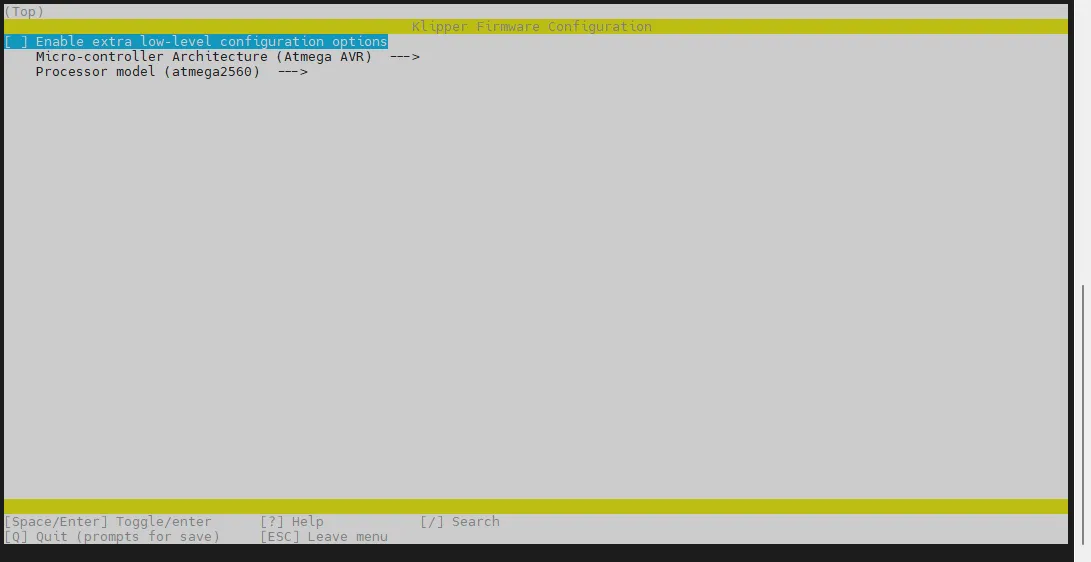
-
Select Enable extra low-level configuration options and press Enter
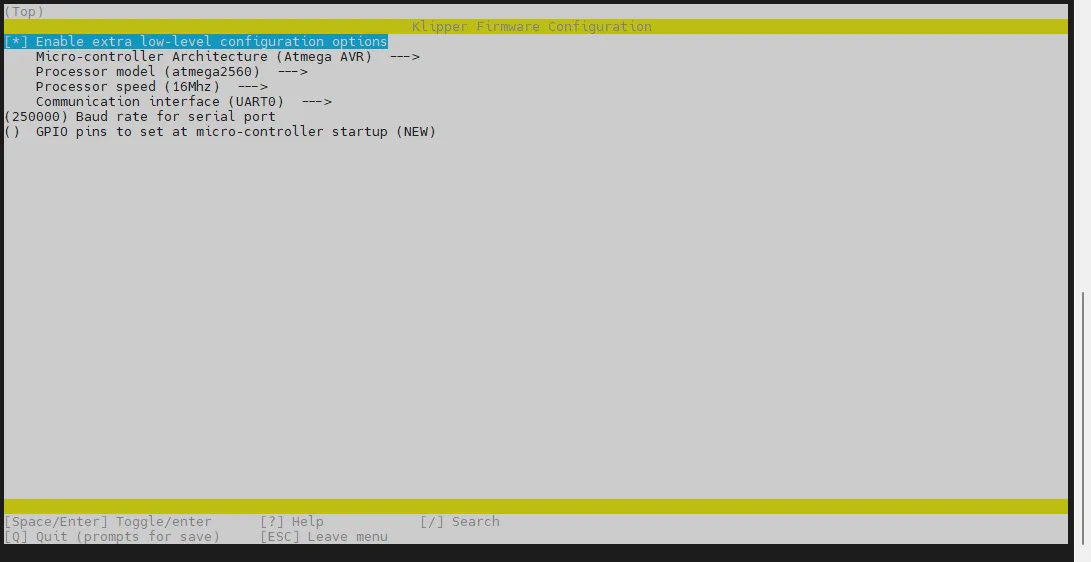
-
Enter the menu Micro-controller Architecture then select STMicroelectronics STM32 and press Enter
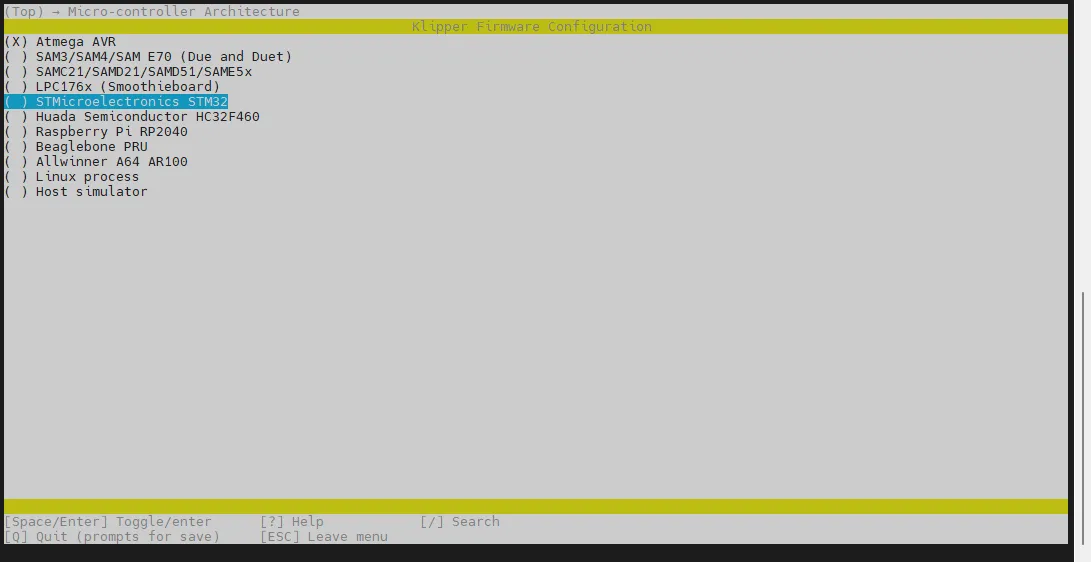
-
Enter the menu Processor model, select STM32F072 and press Enter

-
Select Bootloader offset, choose: 8KiB bootloader

-
Select Communication interface, choose: USB to CAN bus bridge (USB on PA11/PA12) and press Enter
-
After choosing USB to CAN bus bridge (USB on PA11/PA12), the default parameter does not need to be changed CAN bus interface (CAN bus (on PB8/PB9))--->

-
Please verify against the following image to ensure it matches before proceeding with the compilation

- Press the
Qkey, when Save configuration appears, press theYkey - The configuration should now be saved and exited back to the command line interface
- Enter the command below to start compilation, which may take some time
make -j4
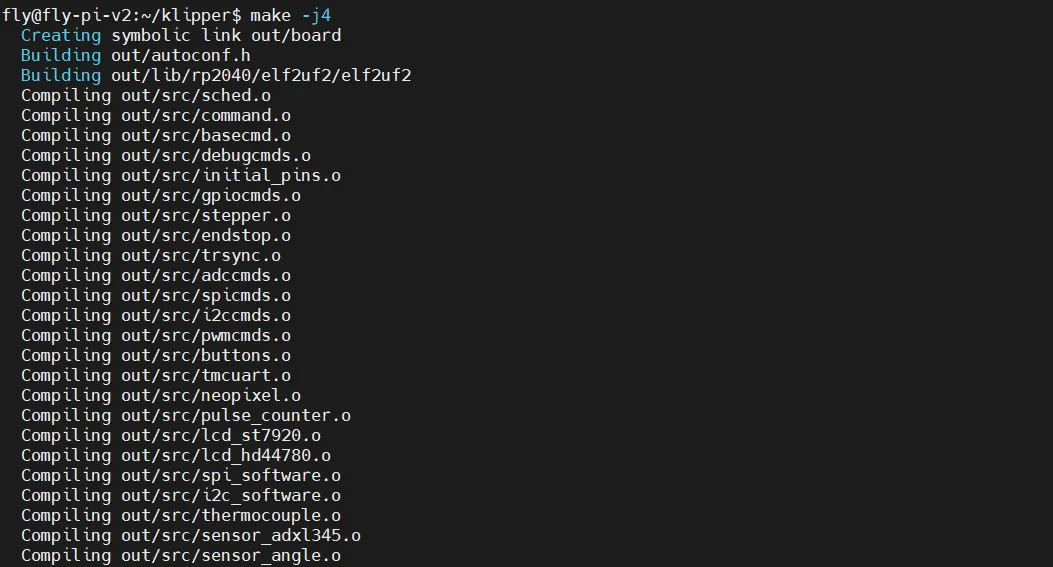
-
Compilation is successful if the final output appears as follows
Linking out/klipper.elf
Creating bin file out/klipper.bin
Enter Flashing Mode
D7 boards manufactured after September 1, 2024 have been pre-flashed with Katapult firmware
- Connect the mainboard to the host computer using a Type-C cable, then double-press the reset button, at which point the LED on the mainboard should start flashing.
- If the LED does not flash, re-flash the Katapult firmware: Flash Katapult firmware
- If the LED still does not flash, proceed to the next step after flashing the Katapult firmware

Confirm Entry into Flashing Mode
- Please ensure that the host machine can connect to the network normally and ensure that the data cable connecting the lower-level machine to the host machine has data transmission function.
- After SSH connecting to the host machine, input
lsusband press Enter. If the information circled in the following picture appears, you can proceed to the next step.- If there is no feedback at all, this is a system problem of the host machine, and we are unable to help. You need to replace with a confirmed normal system or replace the host machine.
- If the prompt says there is no
lsusbcommand, you can execute the following command to install it:sudo apt-get install usbutils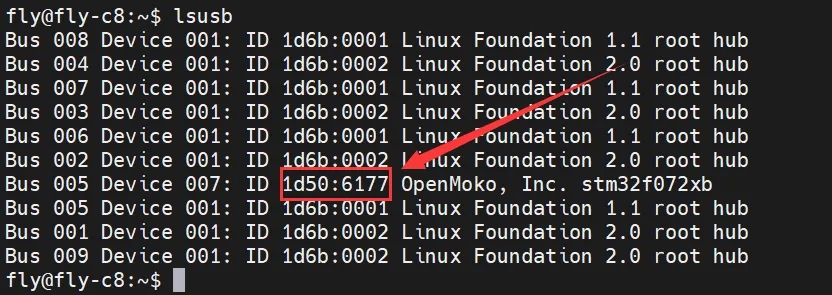
1d50:6177belongs to the device you will use this time.- Some host machines may not fully display or fail to display due to system problems.
- If the
lsusbcommand can display the device but does not show1d50:6177, please try replacing the data cable and connecting the mainboard to another USB port on the host machine.
- If you have executed the above steps before and successfully burned the Klipper firmware, and the mainboard is running normally, but you just want to update the Klipper firmware, please directly check the
Firmware Updatesection in the right menu bar of this page.
You must query the 1d50:6177 device before proceeding to the next step.
Flash the Firmware
- Internet connection is required when installing the flashing plugin. Please ensure your host machine is properly connected to the internet.
- If already installed, there is no need to install again.
Start Flashing
-
For non-fly host machines, please execute the code below to install the required dependency packages for firmware flashing! Otherwise, the firmware cannot be flashed!
- Default Repository
- Domestic Repository
cd && git clone https://github.com/Arksine/katapult.gitcd && git clone https://gitee.com/MrCakeFuck/katapult.git
-
Use the command below to search for your device ID. The ID shown in the figure below should appear (Note: The ID shown in the figure is for reference only; each motherboard has a unique ID).
ls /dev/serial/by-id/*
-
Use the code below to flash the firmware. Please ensure the firmware has already been compiled, and replace
<你的主板ID>with the ID obtained in the previous step.
- Fly-Armbian and Standard Host Flashing Method
- Fly-FAST Flashing Method
~/klippy-env/bin/python ~/katapult/scripts/flashtool.py -d /dev/serial/by-id/<你的主板ID>
python ~/katapult/scripts/flashtool.py -d /dev/serial/by-id/<你的主板ID>
-
Reference image is shown below:
-
Reference after flashing is completed:

Firmware Update
- USB Firmware Update
- Bridged CAN Firmware Update
-
Use the following command to search for your motherboard ID. The ID shown in the figure below should appear (Note: The ID shown in the figure is for reference only; each motherboard has a unique ID).
ls /dev/serial/by-id/*
The ID /dev/serial/by-id/usb-katapult_rp2040_E662549553642032-if00 in the figure below is the motherboard ID.

-
After compiling the latest firmware, use the command below to update the USB firmware. Please replace
<你的主板ID>with the ID obtained in the previous step.cd ~/klipper/ && make flash FLASH_DEVICE=<你的主板ID>
- To update the bridged CAN firmware over USB, after compiling the latest firmware, run the command below to reset into Katapult. (As shown in the figure below, the ID is for reference only; please use the ID from your configuration file.)
<CANBUS UUID>is the CANBUS UUID of the motherboard specified in your printer.cfg configuration file.
- Fly-Armbian and Standard Host Reset to Flash Method
- Fly-FAST Reset to Flash Method
- Replace
<你的主板ID>with the ID obtained in the previous step.~/klippy-env/bin/python3 ~/katapult/scripts/flashtool.py -i can0 -r -u <CANBUS UUID>
- Replace
<你的主板ID>with the ID obtained in the previous step.python3 ~/katapult/scripts/flashtool.py -i can0 -r -u <CANBUS UUID>
- The
f95cee90e1f9in the figure below is the CANBUS UUID of the motherboard.

-
After resetting into Katapult, use the command below to search for your motherboard ID. The ID shown in the figure below should appear (Note: The ID shown in the figure is for reference only; each motherboard has a unique ID).
ls /dev/serial/by-id/*
The ID /dev/serial/by-id/usb-Klipper_stm32f072xb_43002C000951324757373520-if00 in the figure below is the motherboard ID.

-
Ensure the new firmware has been compiled before executing the flashing. Replace
<你的主板ID>with the ID obtained in the previous step.cd ~/klipper/ && make flash FLASH_DEVICE=<你的主板ID>
Recovery Method for Incorrect Firmware
- Power off the motherboard, then power it on again and double-press the reset button quickly to re-enter flashing mode.
- Alternatively, use Windows/host machine to re-flash the Katapult firmware Flash Katapult Firmware